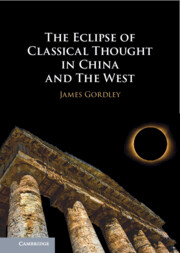Book contents
- The Eclipse of Classical Thought in China and the West
- The Eclipse of Classical Thought in China and the West
- Copyright page
- Dedication
- Contents
- Acknowledgments
- 1 The Dilemma
- Part I Two Ancient Traditions
- Part II The Formation of Two Constitutions
- 8 A Confucian Empire: Song Dynasty China
- 9 A Democratic Republic
- Part III The Eclipse of Classical Thought
- Appendix The Encounter with the Abrahamic Religions
- Index
8 - A Confucian Empire: Song Dynasty China
from Part II - The Formation of Two Constitutions
Published online by Cambridge University Press: 26 July 2022
- The Eclipse of Classical Thought in China and the West
- The Eclipse of Classical Thought in China and the West
- Copyright page
- Dedication
- Contents
- Acknowledgments
- 1 The Dilemma
- Part I Two Ancient Traditions
- Part II The Formation of Two Constitutions
- 8 A Confucian Empire: Song Dynasty China
- 9 A Democratic Republic
- Part III The Eclipse of Classical Thought
- Appendix The Encounter with the Abrahamic Religions
- Index
Summary
In 960, when the army of Zhao Kuangyin (趙匡胤), a military commander, was camped by the Chen Bridge, a dozen miles from the capital, the rumor spread among his soldiers that a portent had occurred. A prophet had seen two suns in the sky. It was believed to be a sign that the mandate of Tian (天) had changed. Tian had conferred the empire on their commander. Zhao was awakened from his sleep a few days later by soldiers who demanded that he accept the title of Son of Heaven (天子). He was asked three times and accepted only after his officers swore unconditional obedience. That, at least, is the story.
- Type
- Chapter
- Information
- The Eclipse of Classical Thought in China and The West , pp. 139 - 154Publisher: Cambridge University PressPrint publication year: 2022

